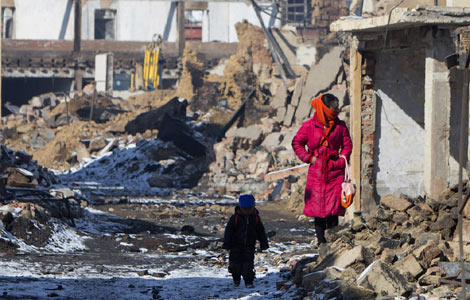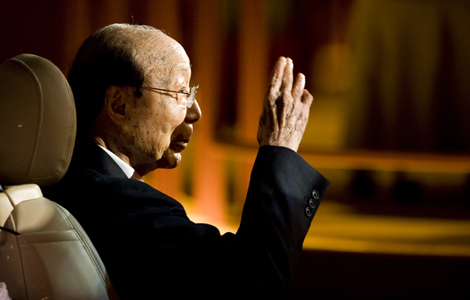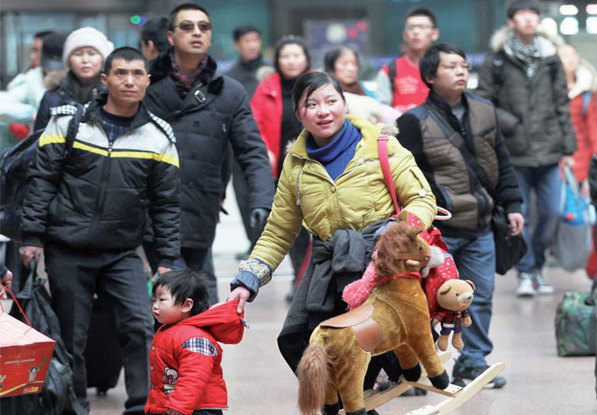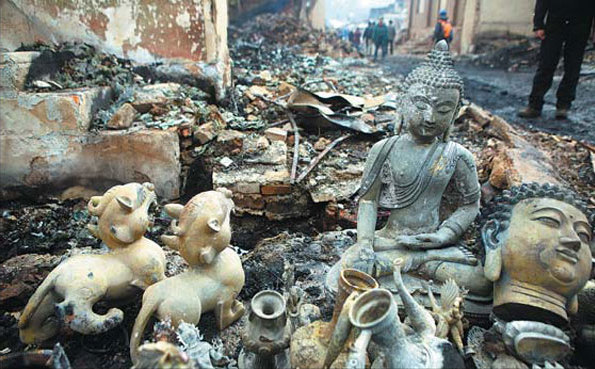What's new
Updated: 2014-01-17 09:27
(China Daily Europe)
|
|||||||||||
|
Passengers at Beijing West Railway Station on Jan 7 ahead of the 40-day Spring Festival travel rush, which started on Jan 9. Zou Hong / China Daily |
Transport system put to test
China's transport system will be put to the test during chunyun, or Spring Festival Transport, the 40-day travel period around the Chinese New Year, which falls on January 31.
Billions of trips will be made during the holiday season, the most important festival for family reunions in the country, placing a tremendous strain on trains, planes and automobiles, and leaving train tickets in scarce supply.
About 3.62 billion passenger trips will be made during the travel period starting on Jan 9, said Lian Weiliang, deputy head of the National Development and Reform Commission.
The figure is about 200 million more than last year, Lian said.
The peak of the travel season will strain the country's transport system and passengers may have difficulties in getting tickets in some regions, Lian warned.
Most of the trips, about 3.2 billion, are expected to be made by road, including long-distance coaches, chartered buses and tour coaches, said Liang Xiao'an, Ministry of Transport spokesman.
Unrest in Bangkok threatens tourism
Thailand may see its projects with China delayed and fewer Chinese tourists visiting the country, analysts said on Jan 13 as protesters started the Bangkok shutdown.
Thousands of demonstrators blockaded several major intersections, demanding a "shutdown" of the Thai capital in an attempt to force Prime Minister Yingluck Shinawatra to step down.
The upheaval is the latest chapter in an eight-year conflict pitting Bangkok's middle class and royalist establishment against the mostly poorer, rural supporters of Yingluck and her self-exiled brother, former premier Thaksin Shinawatra.
"The unrest not only damages economic development in Thailand, but also affects regional cooperation, such as the cooperation between China and Thailand," said Song Qingrun, a Southeast Asian studies researcher at the China Institutes of Contemporary International Relations.
Xi calls for reform to fight graft
President Xi Jinping called on Jan 14 for the Party's disciplinary mechanism to be reformed as China's anti-graft campaign expands.
Officials should abide by the clean-governance rules, and violators must be punished strictly, he said.
"The regulations should not become paper tigers or scarecrows," the president said.
Xi was speaking at the Third Plenary Session of the 18th Central Commission for Discipline Inspection of the Communist Party of China.
The meeting, held from Jan 13-15, was attended by chief disciplinary officials of provincial governments, ministries, State-owned enterprises and public institutions.
Xi said the anti-graft system should be reformed to ensure that power can be supervised effectively and that disciplinary authorities can work independently.
Handling territorial issues based on facts
World leaders must be sensitive to the memory of war victims and address historical or territorial issues based on facts, according to a senior United Nations official.
The UN encourages countries in Northeast Asia to find a common way to understand history, Jeffrey Feltman, UN under-secretary-general for political affairs, said in an interview during a recent trip to Shanghai.
"The rest of the world looks at Northeast Asia as a model where you have economic growth potential that other regions envy," Feltman said.
"But we regret the fact that there are still issues of the past that continue to overshadow this region."
He said it is essential that all UN members touch on the most sensitive issues, be they historical or territorial, based on the facts.
Tech innovation a top priority
Constraints in institutional mechanisms will be dismantled to facilitate greater technological innovation so that it can play a greater role in China's future development, Premier Li Keqiang said on Jan 13.
Li made the remarks in a meeting with the editor-in-chief of Science magazine, Marcia McNutt.
He answered a string of questions from McNutt, covering topics such as space technology, climate change and environmental protection.
"China will deepen reform, break constraints in its institutional mechanisms and make the creativity of people the core in the promotion of innovation," Li said.
Beijing and Sofia vow new initiatives
Bulgaria and China have pledged to enhance cooperation in infrastructure and energy projects after a recent meeting between leaders of the two nations in Beijing.
At the meeting between President Xi Jinping and Bulgarian President Rosen Plevneliev, the two countries inked agreements on marine transportation and for new cultural centers in Beijing and Sofia.
Experts said the agreements would increase Chinese investment in Bulgaria, considered crucial for the European nation's development.
Plevneliev's visit, the first by a Bulgarian president to China in more than 15 years, has also led to the two countries increasing their relationship to a comprehensive partnership of friendship and cooperation.
"Both countries should make concerted efforts to ensure development of bilateral ties in the new era," Xi said.
In his address, Plevneliev said that, "Bulgaria is not the biggest economy in the EU, but one of the best friends of China in the EU".
Blaze raises concern for ancient buildings
A huge fire that engulfed an ancient Tibetan town in Shangri-la, Yunnan province, on Jan 11 has caused experts to call for heightened fire safety in historic locations across the country.
The fire started early on Jan 11 morning and lasted about 12 hours, destroying 242 houses in the old Tibetan town of Dukezong in Shangri-la, capital of the Diqing Tibet autonomous prefecture.
The blaze destroyed about a quarter of the 1,084 houses in the 1,300-year-old town and follows other fires at historic and religious sites in January and November.
The Diqing firefighting bureau said on its Sina micro blog that its efforts were hampered by the need to transfer water from an elevated location, combined with the cold weather and high altitude.
The bureau said that in 2011 it invested 8 million yuan ($1.32 million) in an outdoor fire prevention system, but the combination of negative factors made their job on Jan 11 difficult.
Courts deal 'heavy blow' to separatists
Courts in the Tibet autonomous region heard 20 cases last year in which defendants were accused of endangering national security, as the southwestern region pushes forward the rule of law.
Sodar, Tibet's top judge, released the figure as part of an annual work report to the regional people's congress on Jan 12. Comparison with previous years is not possible, as no such figures were made available in previous reports.
Sodar said judicial authorities last year dealt "a heavy blow" to separatist activities and those that sought to sabotage and threaten national security.
He said local authorities have established a leading team to handle criminal cases that relate to issues of stability, without disclosing details.
Trending Across China
Re-creating Titanic to boost tourism
A private company in Southwest China's Sichuan province said on Jan 12 that it planned to build a replica of the Titanic to boost tourism.
The replica, which is expected to be completed in two years, will be placed on the banks of Qijiang River in Daying county of Sichuan province to attract tourists, Xinhua News Agency reported.
More than 1,500 people perished after the Titanic went down on April 15, 1912, after striking an iceberg on its maiden voyage, from Southampton to New York.
Director accepts hefty fine
Chinese film director Zhang Yimou accepted a whopping fine of 7.48 million yuan ($1.23, 906,000 euros) for violating the country's family planning policy. He is expected to pay the fine before Spring Festival, Western China Metropolis Daily reported on Jan 12.
Media reports revealed that Zhang and his wife Chen Ting parented three children, sparking massive controversy. Zhang published an open letter of apology in December.
Internet billionaire Jack Ma appealed on the Internet for the public to forgive Zhang Yimou.
Monkey King's descendant?
A woman claiming to be the descendant of the Monkey King posted photos of a stone and monkey hairs "handed down from her ancestors" on Sina Weibo account Mamadefeifei.
According to her weibo posts, she has been to Fudan University to prove her identity through DNA tests.
Monkey King is the main character in the 16th century Chinese novel Journey to the West authored by Wu Cheng'en. He is a monkey born from a stone who acquires supernatural powers through Taoist practices. After rebelling against heaven and being imprisoned under a mountain by the Buddha, he later accompanies the monk Xuanzang on a journey to retrieve Buddhist sutras from India.
Hukou reform may be put into practice
Beijing government officials disclosed to the media that the capital will put into practice a new residence permit system to allow people who live and work in the city without hukou (permanent residence) to buy houses and cars.
Currently, people without hukou have to register for a temporary residence license, which comes with many restrictions.
Advertisement shows mother's regret
A woman published a newspaper ad in Australia, saying that she will not push her son to marry anymore if he comes home for Chinese New Year.
The woman said on the front page of a Chinese-language newspaper in Melbourne that her son stopped answering her calls since she kept urging him to marry.
China Daily-Xinhua
|
Buddha statues lie among the wreckage after a fire destroyed hundreds of buildings in Dukezong, Yunnan province, on Jan 11. Provided to China Daily |
(China Daily European Weekly 01/17/2014 page2)
Today's Top News
Xi writes to Chinese in German colleges
China software to rival Android
Will China dominate the world?
Mainland policy lures HK students
Obama tells Germans he will not wiretap
Party is over for SOEs conferences
Egypt referendum wins support
Home prices continue to climb
Hot Topics
Lunar probe , China growth forecasts, Emission rules get tougher, China seen through 'colored lens', International board,
Editor's Picks

|

|

|

|

|

|







